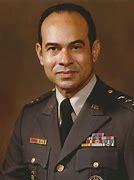Lieutenant General Gregg served in two wars and held key Quartermaster command assignments in the United States, Korea, Japan, Europe and Vietnam. In his final assignment as Deputy Chief of Staff for Logistics in Washington, D.C., he exercised staff responsibility for the logistical support of the whole U.S. Army. His actions in the areas of laundry and bath, food service, and provisions for clothing and equipment ensured the well-being of thousands of soldiers. He also represented the U.S. in the North Atlantic Treaty Organization and other multinational logistics organizations and conferences.
General Arthur James Gregg was born on May 11, 1928 near Florence, South Carolina. He obtained his elementary education in South Carolina, but moved to Newport News, Virginia during high school where he observed the military lifestyle. After graduating from high school, General Gregg went to Chicago, Illinois to obtain training as a medical laboratory technician. Due to segregation laws that were in place at the time, General Gregg was not allowed to handle white patients, so he returned to Virginia in 1945 to enlist in the United States Army at the age of 17.
The Army sent General Gregg to Germany as a medical laboratory technician, but due to low demand, he transferred to the position of unit supply sergeant. After spending three-and-a-half-years in the Army, he applied and was accepted into Officer Candidate School and left OCS as a First Lieutenant due to his academic excellence in 1950. In 1965 General Gregg graduated (Summa cum laude) from Command and General Staff College at Ft. Leavenworth, Kansas and simultaneously obtained a Bachelor of Science from Saint Benedict College.
General Gregg was assigned to many positions and locations through his time in the Army. These include the 403rd Quartermaster Depot, Camp Hakata, Japan as Post Quartermaster, Army Reserve units in Carlisle Barracks, Pennsylvania, Quartermaster Advance Course in Fort Lee, Virginia, Army Materiel Command in Washington, D.C., and 3764th Quartermaster Direct Supply Company.
In 1965 General Gregg assumed command of the 96th Quartermaster Direct Support Battalion in South Vietnam. His battalion was awarded the Meritorious Unit Citation and Lieutenant General Gregg was awarded the Legion of Merit for their outstanding effort.
Returning to the U.S. in 1967, he was assigned to Joint Petroleum Office, Logistics Directorate, US European Command where he was responsible for the communication between the US and NATO petroleum logistics. General Gregg was promoted to Brigadier General in 1972 prior to taking control of the Army and Air Force Exchange System in Germany.
In 1977, President Jimmy Carter nominated General Gregg for the position of Director of Logistics, Organization of the Joint Chiefs of Staff, and approved his nomination to Lieutenant General. In that post General Gregg’s goal was to improve the readiness of the armed forces. This position led to the acceptance of the position of Deputy Chief of Staff, Logistics for the US Army in 1979. Greg also attended the Harvard University John F. Kennedy School of Government concentrating in Executive Program in National Security.
General Gregg retired from the US Army in 1981. Since then he has served on numerous boards such as the one for the Quartermaster association. General Gregg was appointed founding trustee and chair of the Board of Trustees of Excelsior College in 1998 and chair emeritus in 2008. He also received an honorary degree from Excelsior College in 2012. He also received the General Creighton W. Abrams Medal from the Association of the US Army. In 2016, the US Army created the Lieutenant General Gregg Award to honor his leadership and innovation.
General Gregg and his wife Charlene have two daughters, Sondra and Alicia.

